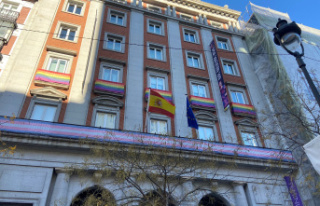The final fireworks of this Wednesday's super plenary session was a new debate around the amnesty law that has been persecuting the Government so much since the legislature started. Junts kept in the air literally until the last minute the three decrees brought by the Executive to Congress and the opposition, while defending its amendments to the entire norm, took advantage of the surreal situation to reproach Pedro Sánchez for his concessions to the independence movement that have not served more than to make each negotiation "agony" throughout this mandate.
"If anyone had any doubts, today they are being seen," launched the general secretary of the Popular Party, Cuca Gamarra, when the general feeling in the Senate - where the plenary session for reforms in Congress was held - was still that Carles' formation Puigdemont would drop the three decrees and the Government would suffer its first major defeat of the legislature. The nervousness, tension and uncertainty until the end served the PP to illustrate how Sánchez has no control over the majority that supports him and the daily "entanglement" to which he is willing to go, amnesty through, in order to remain in La Moncloa .
With this idea, the popular party defended its amendment to the norm, based on the proposal to "dissolve" by law those parties that propose "criminal conduct" such as an illegal referendum or unilaterally declaring the independence of a territory. An initiative that has generated controversy in recent days but that Gamarra maintained as a "political opportunity" with "legal certainty" to classify this type of actions in the Penal Code and protect the Constitution.
An amendment, like that of Vox, that has no effect as the proponents are left alone while the Government and its pro-independence allies accuse them of taking advantage of the tool of the parliamentary amendment to introduce new criminal wordings. Vox, in fact, went a step further by proposing the classification of the crime that persecutes "those who negotiate matters pertaining to the Cortes Generales with those who have been prosecuted or removed from the action of Justice for crimes against the Constitution, public order , treason and the independence of the State and peace and national defense".
Its spokesperson, Pepa Millán, pointed out how the PSOE accepted the wording of this norm in order to "screw itself into power" in exchange for the seven votes of the Junts deputies, and that the main consequence of the norm, which continues its journey parliamentary, is the differentiation between first-class and second-class citizens, especially in Catalonia.
The debate once again showed the dynamics of alliances and positions regarding the amnesty. Vox was left alone in its vote with only 33 votes in favor of its deputies. For its part, the PP - which requested the vote by in-person call - did receive Vox's support for its amendment. He also had the support of the UPN deputy. The final result was, with 349 votes cast, 171 in favor compared to 178 against, so this amendment was also discarded.












